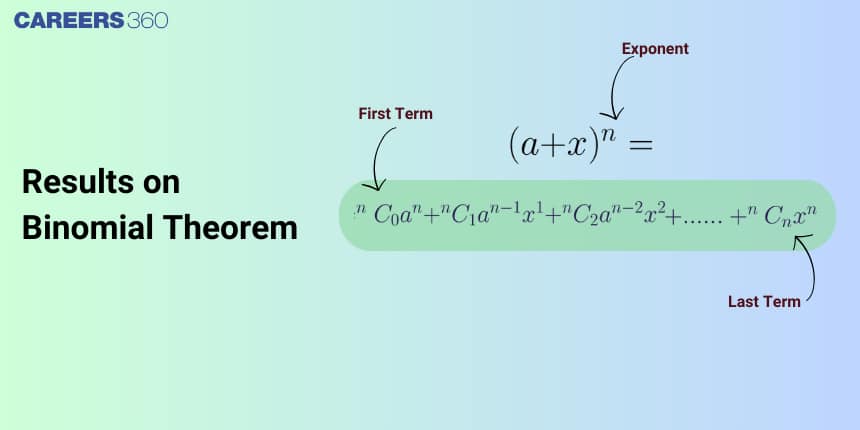Results on Binomial Theorem
An expression with two terms is called the binomial expansion. In the case of higher degree expression, it is difficult to calculate it. In these cases, Binomial theorem can be used to calculate it manually. Binomial theorem is used for the expansion of a binomial expression with a higher degree. Binomial theorem is proved using the concept of mathematical induction. Apart from Mathematics, Binomial theorem is also used in statistical and financial data analysis.
JEE Main: Study Materials | High Scoring Topics | Preparation Guide
JEE Main: Syllabus | Sample Papers | Mock Tests | PYQs

This article is about some results on binomial theorem which falls under the broader category of Binomial Theorem and its applications. It is one of the important topics for competitive exams.
Binomial Theorem
Statement: If
Proof:
The proof is obtained by applying the principle of mathematical induction.
Let the given statement be:
For
Thus,
Suppose
We shall prove that
Now,
[from (1)]
[by actual multiplication]
[grouping like terms]
(by using
Thus, it has been proved that
Binomial Coefficient
The combination
Theorems on Binomial Theorems
Theorem 1:
Proof:
Expand,
Hence, from above
Theorem 2:
Recommended Video Based on Results on Binomial Theorem:
Solved Examples Based on Results on Binomial Theorem
Example 1: If
1)
2)
3)
4) Both 1 and 3
Solution:
As we know,
Let
Hence,
Now,
Hence,
Hence, the answer is option 4.
Example 2: What is the value of an integer just less than
1)
2)
3)
4)
Solution:
Now,
It can be written as
hence,
Hence, the answer is option 3.
Example 3: Suppose
1)
2)
3)
4)
Solution:
Hence, the answer is
Example 4: The value of the natural numbers
1) For
2) For
3) For
4) For any
Solution:
Check through the options, the condition
Hence, the answer is option (1).
Example 5: The greater of the two numbers
1)
2)
3) Both of the above
4) None of the above
Solution:
For
Putting
Hence, the answer is option (1).
Also Read
11 Feb'25 08:44 PM
11 Feb'25 08:26 PM
11 Feb'25 08:17 PM
11 Feb'25 08:04 PM
11 Feb'25 07:47 PM
11 Feb'25 10:54 AM
11 Feb'25 10:45 AM
11 Feb'25 10:41 AM
11 Feb'25 10:38 AM
11 Feb'25 12:12 AM

